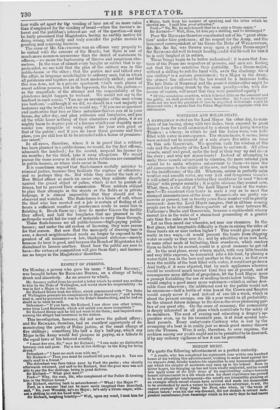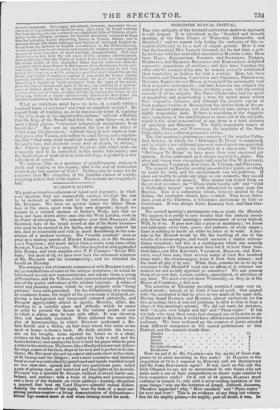MODEST MERIT.
WE quote the following advertisement as a perfect curiosity. "A youth, who has completed his eighteenth year within one hundred hours of his writing this advertisement, wishing to make head against the res angusta domi, hereby tenders his capacities to any honourable patron- age which the chapter of accidents may raise up in his behoof. Born to better hopes, his bringing up has not been wholly neglected, and he would fain apply some of the little items of his unpretending .culture towards honest advancement in a life which even his short experience has proved to be not altogether unchequered—the mind's eye irresistibly glancing at an example which recent events have revived and made too •memorable to be overlooked by such a votary to fortune as the advertiser, to wit, the august example of King Philip the First, who when, in ' the turns of chance below,' even his star was dimmed, did not disdain to extract inde- pendent maintenance from knowledge which in his early days he had .learnt as mere ornament. This young adventurer, however, deprecates the ex- citement of expectations in which he may, upon trial, be found wanting. Far from aiming, like the variously-accomplished Duke of Orleans, at geo- metry or the sublimer sciences, the humble advertiser ventures to hope that his tolerable, hourly improving, fluency in French, Italian, and in modern Greek (the latter language now become of increased English in- terest from the increase of English colonization in the Mediterranean), would enable him to give lessons and materially conduce to perfect pupils in each of those branches at most moderate remunerations. That same Nediturranean has been the sad cause of this anxious advertisement. Near 1,900 years after the Prince of Latian Poets wrote his description of the storm which, all but, ingulphed Eneas and his followers—that de- scription which from Homer to Shakspeare, from Shakspeare to the pre- sent hour, the universe of poetry has never equalled—even in that very part of that very. sea, a sudden springing up of that wind, which though the desire and delight of northern regions is proverbial for storms (creber procellis Atrium) not confinrd to illustrating the poet's text in abruptly shrouding a shipful of noble creatures' from the sight of the clouds, from the face of heaven and light of the day, not confined to a present- ment of instant death to all on shipboard, but in rending reality, de- 7:riring every soul of clouds, of light and life, by sinking the whole in the fell ocean, without a sinale survivor—the advertiser's dear father (an English functionary in the Ionianislands) being one of the sufferers.'
What an ambitious mind have we here, .in a youth within a hundred hours of eighteen ! and what an amplitude of style! He cannot think of teaching, or, as he ingeniously terms it, applying " the little items of his unpretending culture," without reflecting that the King of the French had done the same thing—or, in the more refined phrase, "extracted independent maintenance from knowledge?' Nor can he mention the loss of his father in " that same Mediterranean," without dating it near nineteen hun- dred years after VIRGIL, and calling to mind Eneas, and complain- ing that " that same wind would not confine itself to illustrating the poet's text, and deprived every soul of clouds, by sinking," &e. Clouds may be a misprint for clods, with which souls are commonly said to be connected in this mortal tabernacle ; and the deprivation of souls of their clods (of clay), is probably a new refinement of speech. We instance this as a specimen of grandiloquence curious in itself, and tending to the inquiry, what is the sort of instruction which bears this manner of fruit ? Nothing can be worse for its purposes than the education of the humbler classes of society, excepting indeed that of the higher. The systems are everywhere bad.



























 Previous page
Previous page